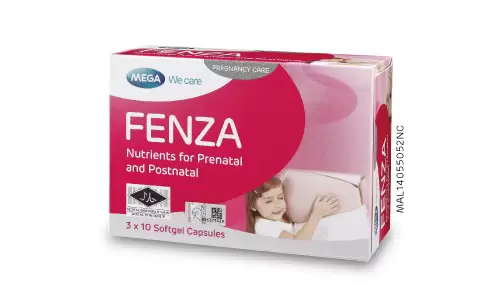
Pregnancy DHA – For a happy mother and a healthy baby
Jun 2, 2016
Introduction
Pregnancy is a blessed event that marks the beginning of a new chapter in a woman’s life. However, the 9-month journey isn’t exactly smooth sailing for mothers-to-be.
Maternal nutrition is a major concern during pregnancy. The main emphasis is on the importance of omega-3 fatty acids namely docosahexaenoic acid(DHA) for optimal foetal brain and eye development. The human brain starts to form during the first trimester of pregnancy, as early as 3 weeks after conception and brain development peaks during the last trimester and thus, substantial amounts of DHA is required. During pregnancy, the foetus is wholly dependent on the mother for nutritional needs and hence, pregnant women must consume adequate amounts of DHA-rich foods.
Recent studies demonstrate that a high maternal DHA intake during pregnancy leads to a higher DHA status at birth and promotes cognitive development, attention, movement quality and visual acuity in infancy to early childhood. DHA seems to give babies an edge in terms of early development. A 2003 study published in the journal Pediatrics showed children whom mothers took a DHA supplement during pregnancy scored higher on intelligence tests at four years of age than children of mothers not taking DHA supplements.
DHA may also be the nutrient to keep you an upbeat mummy. Being pregnant, you may feel perfectly fine one minute and in tears the next. The negative emotions may go on until after delivery. In this matter, DHA may play a part in warding off the gloomy sense of despair. Studies have found that mothers with postpartum depression have lower levels of DHA in their bodies.
Experts from The International Society for the Study of Fatty Acids and Lipids (ISSFAL) recommend that pregnant women should take at least 300mg of DHA each day. Mothers-to-be can obtain the key nutrient either from consuming oily fish such as tuna, mackerel, salmon and sardine or taking tuna oil capsules.
Tuna oil is a richer source of DHA in comparison to other fish oils. A formulation that contains 135mg (27%) DHA and 35mg (7%) eicosapentaenoic acid, EPA per 500mg capsule is an ideal supplement for pregnant women. This precise blend is similar to the DHA and EPA ratio of 4:1 in breast milk.

Fenza contains 19 types of vitamins and minerals,
with omega 3 and DHA
References
- Ingrid B Helland. (2003) Maternal supplementation with very long chain n-3 fatty acids during pregnancy and lactation augements children’s IQ at 4 years of age. Pediatrics 111: 1.
- S.R. De Vriesea, A.B. Christophea and M. Maes. (2003) Lowered serum n-3 polyunsaturated fatty acid (PUFA) levels predict the occurrence of postpartum depression: Further evidence that lowered n-PUFAs are related to major depression. Life Sciences 73: 3181–3187.



